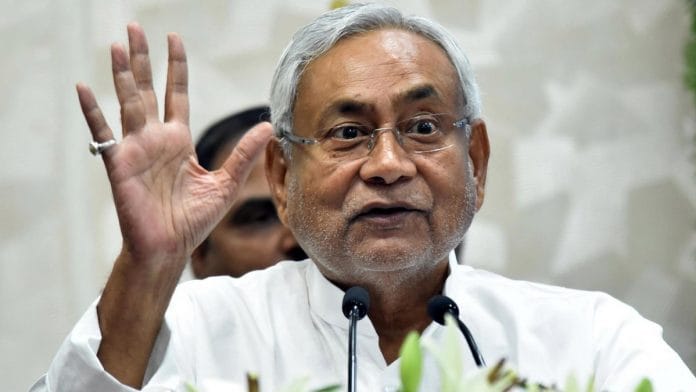Patna: Bihar Chief Minister Nitish Kumar may have fought high-pitched battles against dynastic politics, but he seems to ignore it while inducting members into his party, Janata Dal (United).
The party Thursday formally inducted three RJD MLAs — all of whom belong to political families.
They include Chandrika Rai, father-in-law of former chief minister Lalu Prasad Yadav’s eldest son Tej Pratap Yadav.
Rai is a seven-term MLA from his family’s pocket borough Parasa in Saran district. He is the son of former Bihar CM late Daroga Prasad Rai. Rai joining JD(U), however, comes as no surprise as he had earlier accused Lalu’s wife Rabri Devi and daughter Misa Bharti of torturing his daughter, Aishwarya, after Tej Pratap filed a divorce case.
The second RJD MLA to join JD(U) was Jai Vardhan Yadav — the grandson of one of the tallest Yadav leaders in Bihar, late Ram Lakhan Singh Yadav, who was called ‘Sher-e-Bihar’ by his supporters.
When Lalu held the centre stage of Bihar politics during the 1990s, Ram Lakhan Singh Yadav was the undisputed leader of Yadavs in Bihar. When Nitish Kumar became an MP the first time in 1989, he had defeated Ram Lakhan Singh Yadav from Barh.
Jai Vardhan, a first-time MLA from Paliganj assembly seat, is the son of Prakash Yadav, better known as ‘Baby’, who also happens to be a former MP and MLC.
The third MLA to join is Faraz Fatimi, son of former Union minister and three-term Darbhanga MP A.A.M. Fatimi.
Faraz was one of the three MLAs expelled by the RJD on 17 August for alleged anti-party activities, along with Prema Choudhary and Maheshwar Prasad Yadav. Both Choudhary and Yadav joined the JD(U) on 18 August, along with RJD’s Sasaram MLA Ashok Kumar.
Faraz was also supposed to join the JD(U) on 18 August, but could not do so on the day.
In all, six RJD MLAs have defected and joined the JD(U) so far.
Also read: The BJP should dump Nitish Kumar in Bihar, sooner the better
Nitish’s high-pitch battle against dynasty
Ever since Nitish Kumar has come to power, he has fought a high-pitched battle against dynastic politics.
In 2009, when bypolls were held for 18 assembly seats, Nitish refused to give tickets to family members of MPs and JD(U) leaders despite pressure.
It led to many JD(U) leaders sabotaging the party’s election campaign against dynastic politics and the NDA lost in 13 of the 18 seats.
“His battle against dynastic politics lost its credibility in 2015 when two of Lalu’s sons, Tejashwi Yadav and Tej Pratap Yadav, were sworn in as ministers (in Nitish government),” said a senior JD(U) leader.
However, once Nitish returned to the BJP in 2017, he renewed his attack on dynastic politics.
On 19 September 2017, he disapproved of Congress leader Rahul Gandhi’s statement that dynasty was a fact of life in India. Nitish had said he was against such politics, which was “generated” by the Congress.
He also cited dynasty as one of the reasons for quitting the grand alliance with the RJD and the Congress in 2017, declaring that he served the people, not Lalu’s family.
Nitish also taunted former JD(U) national president Sharad Yadav in 2017, who strongly opposed the snapping of ties with the RJD, saying he had become a promoter of dynastic politics.
In July this year, Nitish’s confidant and JD(U)’s national general secretary (organisation) R.C.P. Singh, while addressing the party’s youth wing, claimed that Nitish never promoted dynastic politics, but in one of the opposition parties (read RJD), first three to five seats always remained reserved for members of a particular political family (read Lalu Prasad family).
The JD(U) has consistently taken pot shots at Tejashwi, Tej Pratap and even Lalu Prasad’s daughter Misa calling them offshoots of dynastic politics.
“There are two things. One is the family dynasty for becoming an MLA or MP. The other is dynastic politics for leading a party. In RJD, senior leaders like Abdul Bari Siddiqui and Raghuvansh Prasad Singh have been ignored to pave way for Tejashwi Yadav to lead the party. Our leadership is not from a political dynasty,” said JD(U) minister Neeraj Kumar.
The Yadav factor
JD(U) leaders pointed out that three out of the six RJD MLAs to join the JD(U) are from the Yadav caste and that too from the families of recognised Yadav leaders like Ram Lakhan Singh Yadav and Daroga Prsad Rai.
“It is a genuine political move to make inroads into RJD’s solid Yadav votes. A Yadav candidate by the NDA always chips some votes off RJD,” said a second senior JD(U) leader, recalling the victories of BJP MP Nityanand Rai and Ram Kripal Yadav in Yadav-dominated constituencies in the 2019 Lok Sabha polls.
He recalled that the NDA had far more Yadav MLAs than the RJD in the 2010 assembly elections.
‘Family politics is a reality’
The RJD, however, said Nitish has never been serious about family politics.
“Nitish has been able to make statements against dynastic politics because his own son Nishant Kumar had openly declared that he would not join politics,” said RJD national vice-president Shivanand Tiwari.
“Nitish Kumar has never been serious about family politics. He has been giving tickets to sons and relatives of politicians in the past like Nitish Mishra, son of former CM late Jaganath Mishra, and Ramnath Thakur, son of former CM late Karpoori Thakur. Family politics is a reality. Nitish has perhaps conceded defeat on this issue,” he added.
Also read: How Nitish Kumar’s fight against corruption has unravelled in 13 years






